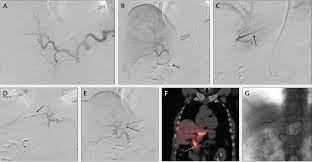
Radioembulization Y91 Farmington
Radioembolization, also known as Y90 or selective internal radiation therapy (SIRT), is a minimally invasive procedure used to treat liver cancer. The procedure involves injecting small beads, called microspheres, containing a radioactive material directly into the liver tumor. This allows for a high dose of radiation to be delivered directly to the tumor, while minimizing exposure to healthy surrounding tissue.
What Is Radioembulization Y91 Farmington:
Radioembulization Y91 Farmington The procedure begins with a diagnostic angiogram, during which a catheter is inserted into an artery in the groin and guided to the liver. Once the catheter is in place, the microspheres are injected directly into the blood vessels that supply the tumor. The microspheres lodge in the blood vessels surrounding the tumor, releasing their radioactive material and delivering a high dose of radiation directly to the cancer cells.
The procedure is typically performed as an outpatient procedure, and patients are able to return home the same day. The procedure is performed under local anesthesia and moderate sedation, so patients are awake during the procedure but do not feel any pain. After the procedure, patients may experience some discomfort or pain in the area where the catheter was inserted, but this usually subsides within a few days.
Radioembolization has been shown to be effective in treating liver cancer, particularly in patients who are not candidates for surgical resection or who have tumors that have spread to other parts of the liver. It is also a good option for patients with multiple tumors or tumors that are not accessible by surgery.
What We Should Know About The Radioembulization Y91 Farmington:
In terms of side effects, radioembolization is associated with a relatively low risk of complications. The most common side effects are nausea, vomiting, and fatigue, which usually resolve within a few days. Other side effects may include pain at the catheter insertion site, fever, and changes in liver function tests. In rare cases, patients may experience more serious side effects, such as bleeding or infection.
During the recovery period, patients are advised to avoid strenuous activity and to drink plenty of fluids to help flush the microspheres out of the body. They will also have regular follow-up imaging to monitor the response of the tumor to the treatment. In some cases, additional treatments may be necessary, such as another session of radioembolization or other forms of therapy.
Radioembulization Y91 Farmington How To get It?
To receive radioembolization (Y90) treatment in Farmington, it typically involves the following steps:
Consultation with a specialist: Your first step would be to schedule a consultation with a specialist in interventional radiology or interventional oncology. During this appointment, the specialist will evaluate your medical history and perform a physical examination to determine if you are a good candidate for the procedure.
Imaging studies: Your specialist will then order imaging studies, such as a CT or MRI scan, to get a detailed view of your liver and the tumors. This will help the specialist plan the procedure and determine the appropriate dose of radiation.
Pre-procedure preparation: Your specialist will give you instructions on how to prepare for the procedure, such as fasting for a certain period of time before the procedure. They will also explain any medications you need to stop taking before the procedure.
Procedure: The procedure itself is typically performed as an outpatient procedure and takes about 1-2 hours. You will be awake during the procedure, but will be given medication to help you relax.
Recovery: After the procedure, you will be taken to a recovery area where you will be monitored for any complications. You will be able to go home the same day, but you will need someone to drive you home. You will be advised to avoid strenuous activities for a period of time, and to drink plenty of fluids to help flush the microspheres out of the body.
It is important to note that the availability of this treatment may vary depending on the location, and it may not be available in all health centers or hospitals. Moreover, coverage of this treatment by insurance providers can vary, it is recommended to check with your insurance provider if the treatment is covered.

If you want to get amazing benefits by using this link
Conclusion:
In summary, radioembolization (Y90) is a minimally invasive procedure for treating liver cancer that delivers a high dose of radiation directly to the tumor, while minimizing exposure to healthy surrounding tissue. It is typically performed as an outpatient procedure and has a low risk of complications. While side effects such as nausea, vomiting, and fatigue can occur, they usually resolve within a few days. This treatment option is especially suitable for patients who are not candidates for surgical resection or who have tumors that have spread to other parts of the liver.

